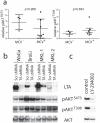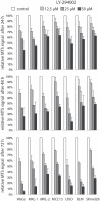Activation of the PI3K/AKT pathway in Merkel cell carcinoma
- PMID: 22363598
- PMCID: PMC3281946
- DOI: 10.1371/journal.pone.0031255
Activation of the PI3K/AKT pathway in Merkel cell carcinoma
Abstract
Merkel cell carcinoma (MCC) is a highly aggressive skin cancer with an increasing incidence. The understanding of the molecular carcinogenesis of MCC is limited. Here, we scrutinized the PI3K/AKT pathway, one of the major pathways activated in human cancer, in MCC. Immunohistochemical analysis of 41 tumor tissues and 9 MCC cell lines revealed high levels of AKT phosphorylation at threonine 308 in 88% of samples. Notably, the AKT phosphorylation was not correlated with the presence or absence of the Merkel cell polyoma virus (MCV). Accordingly, knock-down of the large and small T antigen by shRNA in MCV positive MCC cells did not affect phosphorylation of AKT. We also analyzed 46 MCC samples for activating PIK3CA and AKT1 mutations. Oncogenic PIK3CA mutations were found in 2/46 (4%) MCCs whereas mutations in exon 4 of AKT1 were absent. MCC cell lines demonstrated a high sensitivity towards the PI3K inhibitor LY-294002. This finding together with our observation that the PI3K/AKT pathway is activated in the majority of human MCCs identifies PI3K/AKT as a potential new therapeutic target for MCC patients.
Conflict of interest statement
Figures




References
-
- Becker JC, Houben R, Ugurel S, Trefzer U, Pfohler C, et al. MC polyomavirus is frequently present in Merkel cell carcinoma of European patients. J Invest Dermatol. 2009;129:248–250. - PubMed
-
- Lemos B, Nghiem P. Merkel cell carcinoma: more deaths but still no pathway to blame. J Invest Dermatol. 2007;127:2100–2103. - PubMed
Publication types
MeSH terms
Substances
LinkOut - more resources
Full Text Sources
Medical
Molecular Biology Databases
Research Materials
Miscellaneous

